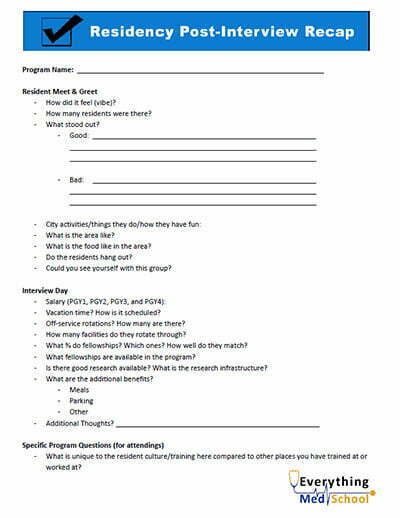The information on this website should not be considered medical advice.
This website contains affiliate links, and we may be compensated for referrals.
Preparing for residency interviews is a critical part of the application process, regardless of whether your interviews are virtual or in-person. An interview can solidify (or counter) who you are on paper, and programs are looking for applicants who “fit,” with both their organizational and social cultures. As a program director told me last cycle, applicants tend to “surprise” admission committees in both good and bad ways.
Here’s our rundown of how you can get started and the dos and don’ts of residency interview preparation:
Plan your rotations carefully; make sure you have time for your interviews (and to prepare for them).
It should go unsaid but ensure you have time to attend your interviews. Don’t get too ambitious about trying to multitask during interview season (usually November-January for ERAS applicants), because your rotation schedule may backfire and make it hard for you to focus/attend your interviews. Schedule time off if you can. If not, schedule rotations that are either virtual or with very low-intensity commitments. Ask graduates from your medical school about what worked well for them; each school typically has its own system catered to interview season.
Know your application inside and out. Read it over and over and over again.
Admissions committees know their applicants. Some will have read your research papers. Some will have gone to the same school as you. Some will know your mentors either professionally or personally. Know every inch of your application. Know your personal statement. Know your research projects, how you contributed, and what you learned from them. Know your “story” and why every individual part of your application ties back to it. What drives you? What pushed you to apply to this field? Remember: typically, interviews aren’t trying to trip you up or to catch you in a lie– they genuinely want to get to know you, and they have already spent time getting to know your application. You should absolutely do the same.
Find common interview questions, and prepare your answers to them. Practice, practice, practice.
Knowing common interview questions is key. Why did you apply to your field? What are you looking for in a program? Where do you see yourself in 5 or 10 years? What would you bring to a residency program? What patient narratives affected you? Why did these stories change or affect your career path? Why did you get involved with research project X, and what did you learn from it?
Next, practice, practice, practice. Set up a Zoom room and record yourself answering each question; work on being well-rehearsed but not too robotic. Look at the camera as you rehearse; eye contact makes a huge difference, especially in the virtual interview setting.
Research each individual program and your interviewers. Have your own questions ready ahead of time.
Most programs will send you a full schedule of your interview day prior to your interview. This schedule will include details regarding who you will be speaking with on interview day. Do your research on each program, but also do your research on the people there. They know exactly who they are talking to (from everything you have put in your application!); there is no reason why you shouldn’t too!
In researching a program, go first to the program’s website. Where would you spend the majority of your time? What would your schedule be like? What is unique about this program (regarding research, programming, support, or training)? Take notes. Write down questions. Know what you want to get out of your interview day ahead of time. In researching your interviewers, find out what their interests are and find your commonalities. This will serve you well on interview day.
Be conscious of your surroundings and your interview set-up. Be intentional (but not too intentional).
Zoom interviews are here to stay in a post-COVID era, so be mindful of what your setting looks like. Look for a plain background with good lighting; I’d suggest buying a ring light to ensure that your face and frame are well-lit.

Try to add a few “talking points” into your background, whether it be related to your hobbies, your upbringing, or your interests; it doesn’t have to be much, but it may help in starting a conversation and making you memorable. And, of course, check your internet connectivity ahead of time to ensure that it is reliable and fast.
Final Thoughts
Take notes, write reflections, and reset. One of the most helpful things you can do after an interview is to take detailed notes on the “vibes”/how you felt. I will note here that, after and for each individual interview, I prepared a “program sheet” (shown here).
This was in an effort to remember the individual characteristics of each program and each interview day; trust me, interviews blend together very quickly, and it is difficult to keep track of them (and what stood out about them) when it comes time to make a rank list. It may even be helpful to start your rank list early. After each interview, add programs to your rough-draft list (in a Word document or on a piece of paper), comparing them (in real-time) to each other.
I also put together a spreadsheet of all the programs I interviewed with. Each column included categories and criteria that mattered to me: location/area, the need for a car, salary, call schedule, clinical sites, number of residents/size of the program, research, mentorship, opportunities for feedback, resident vibes, vacation time, didactics, available fellowships, other perks, and “comments” made by my mentors regarding the program. This spreadsheet (along with my program sheets and draft rank list) really made it easier for me to pick programs when it came time to.
Lastly, reset. Interviews are incredibly exhausting, and, at the peak of your interview season, you may have 4-5 interviews a week. Take time to reset and take care of yourself after every interview; it will help you re-energize and start each interview as if it is your very first one. And, remember, interviews are about putting your best foot forward, but they are also about giving you the information you need to decide where you want to begin your training as a physician. Be organized, get as much information as you can, and have fun with it!
Sunidhi Ramesh, MD is a resident at Thomas Jefferson University and Wills Eye Hospital. She graduated Alpha Omega Alpha and top ten in her class from Thomas Jefferson University. In 2018, she graduated Phi Beta Kappa from Emory University with degrees in both sociology and neuroscience.






Facebook Comments